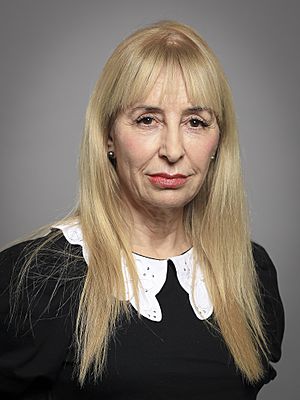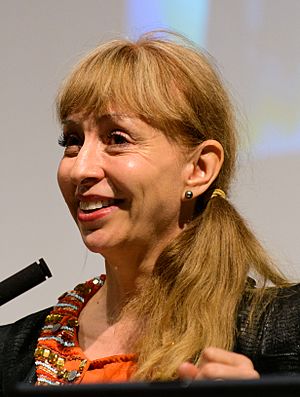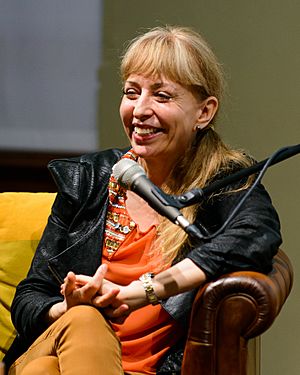Susan Greenfield, Baroness Greenfield facts for kids
Quick facts for kids
The Baroness Greenfield
|
|
|---|---|
 |
|
| Born |
Susan Adele Greenfield
1 October 1950 Chiswick, London, England
|
| Alma mater | St Hilda's College, Oxford |
| Spouse(s) |
Peter Atkins
(m. 1991; div. 2005) |
| Awards | CBE, Knight of the Legion of Honour |
| Scientific career | |
| Institutions |
|
| Thesis | Origins of acetylcholinesterase in cerebrospinal fluid (1977) |
| Doctoral advisor | Anthony David Smith |
Susan Adele Greenfield, also known as Baroness Greenfield, is a famous English scientist, writer, and broadcaster. She was born on October 1, 1950. She is also a member of the House of Lords, which is part of the UK Parliament, since 2001.
Her main research looks at brain diseases like Parkinson's disease and Alzheimer's disease. She also studies how our brains work, especially how we think and feel. She is very interested in how new technology affects our brains.
Greenfield is a senior research fellow at Lincoln College, Oxford. She used to be a professor there, studying how brain cells communicate. From 2005 to 2013, she was the head of Heriot-Watt University in Edinburgh. She also led the Royal Institution of Great Britain from 1998 to 2010. In 2013, she helped start a company called Neuro-bio Ltd, which works on new medicines.
Contents
Early Life and Education
Susan Greenfield's mother, Doris, was a dancer. Her father, Reginald, was an electrician. Susan was the first person in her close family to go to university.
School and University Studies
She went to the Godolphin and Latymer School. There, she studied subjects like Latin, Greek, and ancient history. She also studied maths.
She first went to St Hilda's College, Oxford to study Philosophy and Psychology. Later, she changed her studies to experimental psychology. She earned a top degree in this subject. In 1977, she completed her PhD degree at St Hugh's College, Oxford. Her research was about a brain chemical called acetylcholinesterase.
Career in Science
Susan Greenfield's research mainly focuses on how the brain works. She studies brain diseases like Parkinson's disease and Alzheimer's disease. She is also well-known for making science easy for everyone to understand.
Sharing Science with Everyone
Greenfield has written several books about the brain. She often gives public talks and appears on TV and radio. This helps many people learn about science.
Since 1976, she has published around 200 scientific papers. These papers are studies that other scientists have checked. Her work includes research on how the brain handles addiction. She also looked at brain issues like attention deficit hyperactivity disorder (ADHD).
In 1994, she was the first woman to give the Royal Institution Christmas Lectures. These lectures were shown on the BBC. Her talks were called "Journey to the Centre of the Brain." She became the Director of the Royal Institution in 1998. This role ended in 2010.
Work at Oxford and Beyond
Greenfield held two important jobs at Oxford University. She was a Fellow in Medicine at Lincoln College. She was also a Professor of Synaptic Pharmacology. From 1995 to 1999, she gave public lectures in London.
In 2004 and 2005, she was a "Thinker in Residence" in Adelaide, Australia. Because of her ideas, a new science center was created there. It was called the Royal Institution of Australia.
She has also explored how brain science can help with education. She uses the term "mind change" to describe how the modern world affects our brains.
Neuro-bio Ltd Company
In 2013, she helped start a company called Neuro-Bio Ltd. This company works on tests and treatments for Alzheimer's disease. The company has found a way to stop brain cells from dying. They raised about $4 million in 2017 to continue their research.
In Politics
Greenfield is a member of the House of Lords in the Parliament of the United Kingdom. She sits as a "crossbencher," which means she does not belong to a specific political party.
She has spoken about many different topics in the House of Lords. These topics include education, medicines, and helping women succeed in the economy.
Books Written
In 2013, Greenfield wrote a science-fiction novel called 2121: A Tale from the Next Century. The story is about people who play video games a lot.
In 2014, she published a science book for everyone called Mind Change: How Digital Technologies are Leaving their Mark on our Brains. This book shares her ideas about how digital technology affects our brains.
Awards and Honours
As of 2016, Susan Greenfield has received 32 honorary degrees. She has also won many awards. These include the Royal Society's Michael Faraday Prize. She is an Honorary Fellow of the Royal College of Physicians. She is also an Honorary Fellow of the London Science Museum.
In 2006, she became an Honorary Fellow of the British Science Association. She was also named the Honorary Australian of the Year.
In January 2000, Greenfield received a CBE. This award was for helping the public understand science. Later that year, The Observer newspaper named her Woman of the Year. In 2001, she became a Life Peer. This means she became a Baroness in the House of Lords.
In 2003, the French Government made her a Knight of the Legion of Honour. She also received the Australian Society for Medical Research Medal in 2010. In the same year, she won the British Inspiration award for Science and Technology.
Helping Others
Susan Greenfield supports several charities. She is a patron of Alzheimer's Research UK. She also helps a charity called Science for Humanity. This group works with scientists to find solutions for problems in developing countries.
Personal Life
Greenfield was married to Peter Atkins, a professor at the University of Oxford. They were married from 1991 until their divorce in 2005.
 | Aurelia Browder |
 | Nannie Helen Burroughs |
 | Michelle Alexander |



